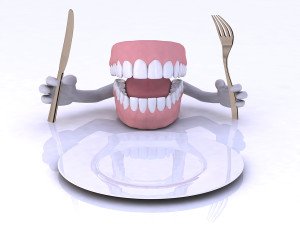Getting Used To New Dentures
 So the apocalypse has finally come: your teeth have finally reached the point where your dentist thinks you should simply pull out the ones that are left and go with full dentures from now on. You were reluctant, but ultimately you knew your dentist was right. Now you have a full set of teeth again, but you have to pull them out every night before you go to sleep.
So the apocalypse has finally come: your teeth have finally reached the point where your dentist thinks you should simply pull out the ones that are left and go with full dentures from now on. You were reluctant, but ultimately you knew your dentist was right. Now you have a full set of teeth again, but you have to pull them out every night before you go to sleep.
For the first few months, you should expect that you’ll need to refit your dentures regularly. Without your teeth to fill them out, your gums will slowly collapse in on the jawbone, shrinking the amount of space your dentures can attach to. In all likelihood, you’ve already experienced this once before when your wisdom teeth were removed. This shrinkage won’t be a major problem for your upper denture, since it’s securely suctioned to the roof of your mouth, but your lower denture may start to wiggle around uncomfortably even with a decent dental adhesive in place.
You should also expect to replace your dentures every few years whether you’ve taken good care of them or not. While your gums will collapse fairly quickly, your jawbone will only slowly begin to shrink once it has no teeth around to stimulate its growth.
It’s possible to halt this degradation by using dental implants, implants which can in some cases attach to your existing dentures, but the implant procedure is significantly more expensive than dentures and it demands that you have a certain amount of bone in the first place so that the implants will have something to anchor onto. Still, many patients find the advantages worth the added price.
Moving to dentures is a big step in anyone’s life, and it requires a lot of adjusting, both mental and physical. Still, when you consider that the alternatives are either baby food forever, an expensive operation, or a painful and potentially life-threatening infection, it’s clear that adapting to dentures is worth the time and effort you spend.